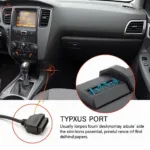Can an OBD2 scanner set off your car horn? It’s a question many car owners have, especially when encountering unexpected honking. While an OBD2 scanner’s primary function is diagnostics, certain scenarios can indirectly trigger the horn, often revealing underlying electrical issues. Let’s delve into the relationship between OBD2 scanners and car horns.
After connecting an OBD2 scanner, especially a low-quality one, some users report their car horn going off unexpectedly. This isn’t a typical function of an OBD2 scanner. These devices communicate with a vehicle’s control modules to retrieve diagnostic trouble codes (DTCs), monitor live data, and perform certain tests. They don’t directly control the horn. However, certain situations can lead to a horn activation, and understanding these is crucial.
How Can an OBD2 Scanner Indirectly Affect the Horn?
One possible reason an OBD2 scanner might seem to activate the horn is a short circuit or faulty wiring within the vehicle’s electrical system. The connection of the scanner can sometimes exacerbate these pre-existing issues, leading to unexpected behavior like horn activation. Think of it like adding a load to a circuit that’s already strained. This is particularly true for older cars or those with aftermarket modifications. You can read more about OBD2 for specific engine types, like the B series, at our obd2 b series engine.
Another scenario involves certain advanced OBD2 scanners that allow bi-directional communication. While less common, these scanners can activate certain components for testing purposes. A user might inadvertently activate the horn during these tests. However, standard OBD2 scanners used for basic diagnostics should not trigger the horn.
Can a Faulty OBD2 Scanner Trigger the Horn?
A poorly designed or malfunctioning OBD2 scanner can potentially introduce voltage fluctuations or short circuits into the vehicle’s electrical system. These issues can interfere with various components, including the horn relay or wiring. While rare, it’s important to consider the quality and condition of your scanner. Check out our reviews on the best bosch obd2 scanner.
What Should I Do If My Horn Goes Off When Using an OBD2 Scanner?
First, disconnect the scanner immediately. Then, inspect the OBD2 port and the scanner’s connector for any damage or debris. If you notice any issues, it’s best to get them checked by a qualified mechanic. Also, consider checking the vehicle’s horn relay and wiring for any signs of damage or corrosion. Learning how to use obd2 reader to check codes can help you diagnose further issues.
Troubleshooting Horn Activation with OBD2 Scanners
- Check the OBD2 port and scanner: Look for bent pins, debris, or damage to both the port and the scanner connector.
- Inspect the horn relay and wiring: Look for loose connections, corrosion, or damaged wiring related to the horn circuit.
- Test with a different OBD2 scanner: If possible, try using a different scanner to rule out a faulty device.
- Consult a mechanic: If the issue persists, a qualified mechanic can diagnose and repair any underlying electrical problems.
“In my experience, the majority of horn activations related to OBD2 scanners are caused by pre-existing wiring issues within the vehicle’s electrical system,” says automotive expert, Michael Davis, ASE Certified Master Technician. “The scanner simply acts as a catalyst, revealing these underlying problems.”
How can I prevent my car horn from going off when using an OBD2 scanner?
Ensuring your car’s electrical system is in good condition and using a high-quality OBD2 scanner can significantly minimize the risk of horn activation. Regular vehicle maintenance can also help prevent these issues. If you’re working with a B-series engine, understanding the differences between OBD1 and OBD2 can be especially helpful. You can learn more about that in our article on obd1 vs obd2 b series distributor.
Conclusion
While an OBD2 scanner itself can’t directly set off a car horn, it can indirectly trigger it by exacerbating underlying electrical issues. Using a high-quality OBD2 scanner and maintaining your vehicle’s electrical system can help prevent these problems. If your horn does activate when using an OBD2 scanner, disconnect the device immediately and inspect the OBD2 port, scanner, and horn wiring for any issues. If the problem persists, consulting a qualified mechanic is recommended. Can an obd2 set off the horn? Usually not directly, but understanding the potential indirect connections is crucial for proper diagnosis and troubleshooting.
FAQ
- Can a cheap OBD2 scanner damage my car? While unlikely to cause significant damage, a cheap or faulty scanner could introduce electrical interference.
- What does it mean if my horn goes off randomly? A random horn activation could indicate various problems, from a faulty relay to wiring issues.
- Can an OBD2 scanner drain my car battery? Generally, OBD2 scanners have minimal power draw and shouldn’t drain your battery unless left connected for extended periods.
- How can I check my car’s electrical system? A qualified mechanic can perform a thorough inspection of your car’s electrical system.
- What should I do if my OBD2 scanner isn’t working? Check the connections, try a different vehicle, or consult the scanner’s manual.
- Are all OBD2 scanners the same? No, OBD2 scanners vary in features, quality, and capabilities.
- Is it safe to use an OBD2 scanner while driving? It’s generally recommended to avoid using an OBD2 scanner while driving, as it can be distracting.
For further information about Ford vehicles and their specific OBD2 drive cycles, refer to our article on obd2 drive cycle ford.
Need help? Contact us via WhatsApp: +1(641)206-8880 or Email: [email protected]. Our customer service team is available 24/7.
